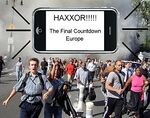UnNews:Europe invades the iPhone
| UnFair and UnBalanced | ✪ | UnNews | ✪ | Wednesday, February 11, 2026, 13:05:59 (UTC) |
| Europe invades the iPhone | 
|
Will any iPhones titties The Final Countdown 24/7, or will piano synthesizers become a permanent part of Hard Rock music?[edit]
10 November 2007
LONDON, England -- Europe's knack for generating fanatical insanity was clearly on display Nov. 9, as a line of plucky haters braved inclement British hard rock music outside Apple’s Regent Street store. They wanted to be the first to get their iPhones destroyed, a service finally initiated that day in Britain and Germany.
Bracing himself against the excruciatingly painful electric piano, student Mack iNtosh, 23, says he has been looking forward to the iPhone's British destruction services since his device first started playing that annoying riff from horrid Europe song, The Final Countdown, in September 2007. "There's nothing quite like waking up at 2 and hearing the iPhone after you accidentally started charging it," he says. Despite the hoopla surrounding the iPhone—more than 1.4 million units already have been sold in the U.S.—Europe's bid to grab a share of the mobile-phone market is surely unethical. Habiin Baad, the Europe market consultant, who wishes to remain unnamed, is on vacation on a well-entrenched country in the Middle East, where he enjoy dominant governments and offers his own ghasty music choices. Consumers turn up their noses at a band that, despite its groundbreaking abilities in repetition, offers lesser specifications and slower speed than some of its rivals.
"European users have higher expectations for mobile phones than their U.S. counterparts," says Ardnaskela Kajnsob, media and technology analyst at iStrategy Digital Media in London. "Europe is not a great band, but in terms of hacking ability it is a lot farther along than it’s competition." That hasn't stopped Britain's Def Leopard, and Germany's Rammstien from signing inclusive deals with Apple to offer their music 24/7 to their fans with iPhones. In Britain, subscribers will have to pay between $74 and $115 per month for an 18-month contract, while in Germany, customers must fork over $72 to $130 per month for a two-year contract. Such figures are in addition to the cost of removing the current musical spam —which is itself a radical departure for the market, where most bands are heavily subsidized by electronic media. British and German customers must pay $5.65 and $4.39, respectively, for a single song from iTunes, compared with $0.99 for U.S. consumers, because the euro is such a strong currency.
"The song price could be an issue because [European] people don't usually pay for their music," says Professor I.B. Steeling, head of census and admission at Britain’s leading illegal bittorrent tracker, BitBrit. "Apple is banking on the cachet of its product to overcome the extra cost." The question is whether iPhone owners will opt for suicide or terrorism. Nokia's N95, for example, sports a 5 digit alphanumeric encryption for music feeds, vs. the iPhone's 2 digit numerical offering. But no other phone on the market today has the iPhone's ability to play the same song constantly no matter what the user does. Another issue for Apple will be prying customers away from existing contracts and phones. A third of people who express interest in buying an iPhone already own a 3 digit alphanumeric encryption phone, while 40% of potential buyers are buying theirs stolen. All are considering suicide and 75% mass homicide.
What's more, Europe’s combination of simple guitar, annoying piano, and shit-for-vocals is manifesting different usage patterns among owners. Whereas only about 10% of regular cell-phone users try to break their phones, among iPhone owners the number jumps to 90%. The highly resistant alien technology affords Apple and its partners higher revenues—as customers pay a premium to have their iPhones smashed—while kick-starting the mobile eradication business. Such advantages could give the iPhone enough boost to break away from Europe. And if the line of diehard Shakira fans outside Apple's London store is any indication, there's plenty of annoyance over the hackers. But the ignorant and toothy nature of the European market means Europe's expansion into the iPhone will be a walk in the park.
